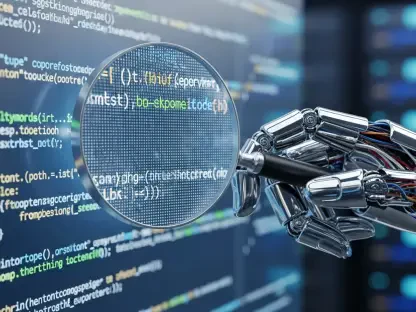In an era where technology evolves at a breathtaking pace, the software development industry stands at a pivotal crossroads, with artificial intelligence (AI) reshaping workflows while developers cling to the irreplaceable value of human connection. According to a comprehensive global survey of over 24,500 developers, the profession is navigating an unprecedented integration of AI tools alongside a renewed emphasis on collaboration and personal well-being. This dynamic tension between cutting-edge innovation and human-centric priorities sets the stage for a deeper exploration of how the industry balances these forces in 2025.
The Evolving Landscape of Software Development
The software development sector today is a vibrant ecosystem, marked by rapid technological advancements and a diverse global workforce. With over 24,500 developers surveyed across continents, the data reveals a field deeply influenced by AI integration, alongside enduring trends in programming languages and productivity metrics. This broad participation underscores the industry’s significance as a driver of innovation in virtually every sector, from finance to healthcare.
At the heart of this landscape lies a delicate balance between embracing new tools and maintaining human priorities. AI has emerged as a transformative force, with widespread adoption reshaping how developers approach their craft. Simultaneously, global market dynamics and technological influences, such as cloud computing and open-source contributions, continue to redefine the scope of development, pushing professionals to adapt to an ever-shifting environment.
Key segments like AI tool usage, language preferences, and productivity evaluation are critical to understanding current trends. Developers are not only adopting AI at an astonishing rate but also witnessing shifts in preferred technologies, with some languages gaining prominence while others fade. These changes, coupled with varying regional job market conditions, highlight the multifaceted nature of the industry and the complex interplay of technology and human elements.
AI in Software Development: Adoption and Impact
Rapid Integration of AI Tools
AI has swiftly become a cornerstone of modern software development, with 85% of developers incorporating these tools into their daily coding routines. A significant 62% rely on AI coding assistants or agents to streamline their work, reflecting a profound shift in operational practices. This rapid uptake is driven by the promise of enhanced efficiency and the ability to handle repetitive tasks with ease.
The impact of AI on time management is striking, as 89% of developers report saving at least an hour each week, and a notable 20% save eight or more hours—effectively reclaiming an entire workday. This efficiency gain has fueled a growing perception, with 68% of respondents viewing AI skills as an emerging job requirement. However, resistance persists among 15% of developers, who cite concerns over security vulnerabilities, inconsistent output quality, and a preference for traditional methods.
Despite this hesitancy, enthusiasm for AI’s potential to automate mundane tasks like boilerplate code generation remains high. Developers welcome the reduction in grunt work, yet many draw a line at entrusting AI with creative or intricate responsibilities. This dichotomy reveals a cautious optimism, as the industry grapples with integrating AI without compromising the integrity of complex problem-solving.
Benefits and Limitations of AI
AI’s benefits are undeniable, particularly in managing routine tasks such as documentation and basic code structuring, allowing developers to focus on higher-level challenges. The time saved translates into tangible productivity gains, enabling teams to tackle ambitious projects with greater agility. This efficiency is a boon for tight deadlines and resource constraints often faced in the industry.
However, limitations temper this enthusiasm, with inconsistent code quality emerging as a primary concern. AI often struggles to grasp the nuances of intricate projects, leading to outputs that require significant manual refinement. Privacy risks also loom large, as developers worry about sensitive data exposure through AI tools, alongside fears that over-reliance could erode critical thinking and technical skills over time.
This duality paints a picture of cautious adoption, where the transformative potential of AI is acknowledged, yet tempered by practical challenges. Developers are eager to leverage AI for operational gains but remain vigilant about its shortcomings. Balancing these benefits and drawbacks will be crucial as the industry continues to evolve with AI at its core.
Challenges in the AI-Driven Development Era
Integrating AI into development workflows presents a host of complexities, from ensuring the reliability of generated code to safeguarding data privacy. Many developers encounter difficulties in trusting AI outputs for mission-critical applications, necessitating rigorous validation processes. Additionally, the risk of data breaches through AI platforms remains a pressing issue, demanding robust security measures.
Beyond technical hurdles, the industry faces broader challenges, including disparities in the global job market. For instance, 57% of Japanese developers view their market conditions favorably, while 66% of Canadian developers find the landscape tough. Such regional variations highlight uneven opportunities and economic pressures that shape career trajectories across borders.
Junior developers, in particular, bear the brunt of these challenges, with 61% reporting significant difficulties in securing roles or advancing skills. Addressing these issues requires innovative solutions, such as enhanced AI training to improve output reliability, stronger security protocols to protect data, and updated hiring practices that support emerging talent through mentorship and accessible learning resources.
Redefining Productivity: Beyond Tools to People
Productivity in software development is undergoing a profound redefinition, moving beyond mere technical output to encompass human factors. A staggering 89% of developers now emphasize non-technical elements like clear communication, thoughtful job design, and supportive management as pivotal to their effectiveness. This shift signals a growing awareness that tools alone cannot sustain high performance.
Yet, a significant disconnect persists in how productivity is measured, with two-thirds of developers feeling that current evaluation methods fail to capture their true contributions. Traditional metrics often overlook the value of collaboration or creative problem-solving, leaving many professionals frustrated. This gap underscores the urgent need for new approaches to assessment.
Advocating for holistic frameworks is essential to bridge this divide, balancing technical achievements with human-centric metrics. Such frameworks would recognize the importance of team dynamics, personal well-being, and effective leadership in driving success. By prioritizing these elements, the industry can foster healthier workplaces where developers thrive both individually and collectively.
Programming Trends and Future Skills
Programming languages are witnessing notable shifts, with TypeScript experiencing a remarkable rise in adoption over recent years. Meanwhile, languages like Rust, Go, and Kotlin are gaining traction for their performance and versatility, reflecting a trend toward modern, efficient tools. In contrast, older languages such as PHP, Ruby, and Objective-C are seeing a decline in usage.
Looking ahead, developers show strong interest in mastering Go, with 11% eager to learn it, and Rust, attracting 10% of respondents. These preferences indicate a focus on languages that offer speed and reliability for future projects. Additionally, niche languages like Scala, though used by only 2% of developers, correlate with high earning potential, as 38% of top earners list it as a primary skill.
The future of skills development hinges on a dual focus: technical proficiency in AI and emerging languages, paired with soft skills like collaboration and adaptability. As the industry evolves, professionals must cultivate expertise in cutting-edge tools while maintaining the interpersonal abilities that underpin effective teamwork. This balanced skill set will be vital for navigating upcoming challenges and opportunities.
The Future of Software Development: Balancing Tech and Human Values
The trajectory of software development points to AI as a defining force, poised to revolutionize workflows and skill expectations in profound ways. Yet, amidst this technological wave, the irreplaceable role of human creativity and connection remains a cornerstone. Developers continue to value the intellectual spark and camaraderie that drive innovation beyond automated processes.
Potential disruptors loom on the horizon, including fluctuating job market conditions across regions and the advent of new technologies that could reshape priorities. The need for updated productivity metrics also emerges as a critical factor, as traditional measures struggle to keep pace with the multifaceted nature of modern development. These elements will likely shape strategic planning in the coming years.
Amidst these changes, the passion for coding endures, with over 50% of developers engaging in personal projects for enjoyment outside work. Community unity, reflected in lighthearted findings like equal affection for dogs and cats, further sustains the industry’s vitality. Balancing technological advancements with these human values will be paramount to ensuring a resilient and inspired future for software development.
Conclusion: A Human-Centric Path Forward
Reflecting on the insights gathered from the extensive survey of over 24,500 developers, it becomes clear that while AI has solidified its role as an indispensable asset in software development, the heart of the industry rests firmly with human connection, collaboration, and well-being. The findings paint a picture of a profession that embraces technological innovation but refuses to let it overshadow the personal and intellectual core of the craft.
Moving forward, the industry needs to prioritize environments that nurture both cutting-edge skills and supportive team dynamics. A sustainable future depends on actionable steps like investing in comprehensive AI training to enhance reliability, developing robust security measures to protect privacy, and reimagining productivity metrics to value human contributions. These efforts promise to harmonize the power of technology with the essence of human ingenuity.
As a final consideration, fostering mentorship programs for junior developers and promoting global equity in job opportunities emerge as vital strategies to address disparities. By committing to these initiatives, stakeholders can ensure that the software development field not only adapts to rapid changes but also thrives as a community grounded in mutual support and shared passion.









